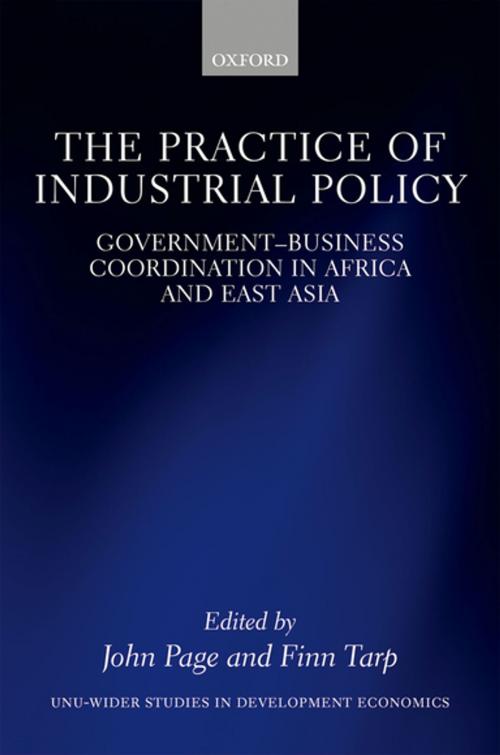The Practice of Industrial Policy
Government—Business Coordination in Africa and East Asia
Business & Finance, Management & Leadership, Industrial Management, Economics, Economic Development| Author: | ISBN: | 9780192517289 | |
| Publisher: | OUP Oxford | Publication: | March 31, 2017 |
| Imprint: | OUP Oxford | Language: | English |
| Author: | |
| ISBN: | 9780192517289 |
| Publisher: | OUP Oxford |
| Publication: | March 31, 2017 |
| Imprint: | OUP Oxford |
| Language: | English |
This is an open access title available under the terms of a CC BY-NC-SA 3.0 IGO licence. It is free to read at Oxford Scholarship Online and offered as a free PDF download from OUP and selected open access locations. Much of the information relevant to policy formulation for industrial development is held by the private sector, not by public officials. There is therefore fairly broad agreement in the development literature that some form of structured engagement — often referred to as close or strategic coordination — between the public and private sectors is needed, both to assist in the design of appropriate policies and to provide feedback on their implementation. There is less agreement on how that engagement should be structured, how its objectives should be defined, and how success should be measured. In fact, the academic literature on close coordination provides little practical guidance on how governments interested in developing a framework for government—business engagement should go about doing it. The burden of this lack of guidance falls most heavily on Africa, where — despite 20 years of growth — lack of structural transformation has slowed job creation and the pace of poverty reduction. Increasingly, African governments are seeking to design and implement policies to encourage the more rapid growth of high productivity industries and in the process confronting the need to engage constructively with the private sector. These efforts have met with mixed results. For sustained success in structural transformation, new policies and new approaches to government-business coordination will be needed. In 2014 the Korea International Cooperation Agency and UNU-WIDER launched a joint research project on 'The Practice of Industrial Policy'. The objective of the project was to help African policy-makers develop better coordination between the public and private sectors in order to identify the constraints to faster structural transformation and to design, implement, and monitor policies to remove them. This book, written by national researchers and international experts, presents the results of that research.
This is an open access title available under the terms of a CC BY-NC-SA 3.0 IGO licence. It is free to read at Oxford Scholarship Online and offered as a free PDF download from OUP and selected open access locations. Much of the information relevant to policy formulation for industrial development is held by the private sector, not by public officials. There is therefore fairly broad agreement in the development literature that some form of structured engagement — often referred to as close or strategic coordination — between the public and private sectors is needed, both to assist in the design of appropriate policies and to provide feedback on their implementation. There is less agreement on how that engagement should be structured, how its objectives should be defined, and how success should be measured. In fact, the academic literature on close coordination provides little practical guidance on how governments interested in developing a framework for government—business engagement should go about doing it. The burden of this lack of guidance falls most heavily on Africa, where — despite 20 years of growth — lack of structural transformation has slowed job creation and the pace of poverty reduction. Increasingly, African governments are seeking to design and implement policies to encourage the more rapid growth of high productivity industries and in the process confronting the need to engage constructively with the private sector. These efforts have met with mixed results. For sustained success in structural transformation, new policies and new approaches to government-business coordination will be needed. In 2014 the Korea International Cooperation Agency and UNU-WIDER launched a joint research project on 'The Practice of Industrial Policy'. The objective of the project was to help African policy-makers develop better coordination between the public and private sectors in order to identify the constraints to faster structural transformation and to design, implement, and monitor policies to remove them. This book, written by national researchers and international experts, presents the results of that research.















